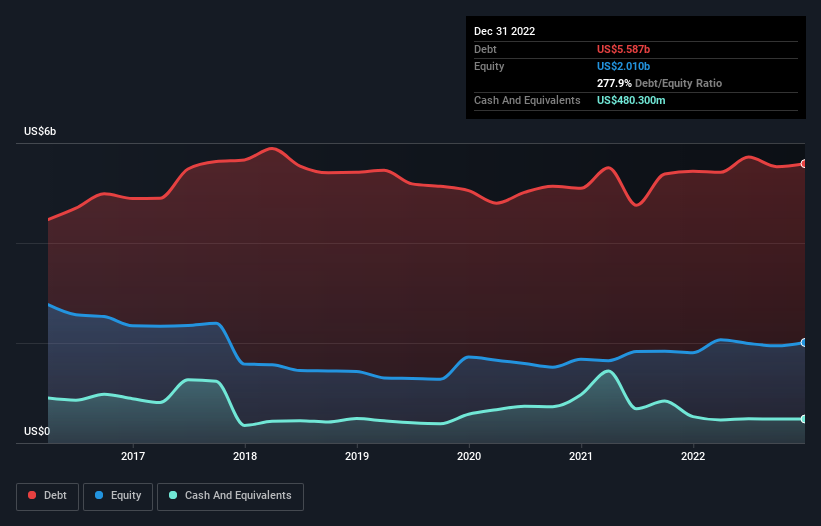Howard Marks put it nicely when he said that, rather than worrying about share price volatility, 'The possibility of permanent loss is the risk I worry about... and every practical investor I know worries about.' It's only natural to consider a company's balance sheet when you examine how risky it is, since debt is often involved when a business collapses. As with many other companies Kennedy-Wilson Holdings, Inc. (NYSE:KW) makes use of debt. But is this debt a concern to shareholders?
What Risk Does Debt Bring?
Debt is a tool to help businesses grow, but if a business is incapable of paying off its lenders, then it exists at their mercy. In the worst case scenario, a company can go bankrupt if it cannot pay its creditors. However, a more common (but still painful) scenario is that it has to raise new equity capital at a low price, thus permanently diluting shareholders. Of course, debt can be an important tool in businesses, particularly capital heavy businesses. When we examine debt levels, we first consider both cash and debt levels, together.
View our latest analysis for Kennedy-Wilson Holdings
What Is Kennedy-Wilson Holdings's Net Debt?
The chart below, which you can click on for greater detail, shows that Kennedy-Wilson Holdings had US$5.59b in debt in December 2022; about the same as the year before. However, because it has a cash reserve of US$480.3m, its net debt is less, at about US$5.11b.

How Strong Is Kennedy-Wilson Holdings' Balance Sheet?
According to the last reported balance sheet, Kennedy-Wilson Holdings had liabilities of US$922.3m due within 12 months, and liabilities of US$5.34b due beyond 12 months. On the other hand, it had cash of US$480.3m and US$232.4m worth of receivables due within a year. So its liabilities outweigh the sum of its cash and (near-term) receivables by US$5.55b.
The deficiency here weighs heavily on the US$2.34b company itself, as if a child were struggling under the weight of an enormous back-pack full of books, his sports gear, and a trumpet. So we definitely think shareholders need to watch this one closely. After all, Kennedy-Wilson Holdings would likely require a major re-capitalisation if it had to pay its creditors today.
In order to size up a company's debt relative to its earnings, we calculate its net debt divided by its earnings before interest, tax, depreciation, and amortization (EBITDA) and its earnings before interest and tax (EBIT) divided by its interest expense (its interest cover). Thus we consider debt relative to earnings both with and without depreciation and amortization expenses.
Kennedy-Wilson Holdings shareholders face the double whammy of a high net debt to EBITDA ratio (21.5), and fairly weak interest coverage, since EBIT is just 0.33 times the interest expense. The debt burden here is substantial. Another concern for investors might be that Kennedy-Wilson Holdings's EBIT fell 12% in the last year. If things keep going like that, handling the debt will about as easy as bundling an angry house cat into its travel box. The balance sheet is clearly the area to focus on when you are analysing debt. But ultimately the future profitability of the business will decide if Kennedy-Wilson Holdings can strengthen its balance sheet over time. So if you want to see what the professionals think, you might find this free report on analyst profit forecasts to be interesting.
Finally, while the tax-man may adore accounting profits, lenders only accept cold hard cash. So it's worth checking how much of that EBIT is backed by free cash flow. Over the last two years, Kennedy-Wilson Holdings barely recorded positive free cash flow, in total. Some might say that's a concern, when it comes considering how easily it would be for it to down debt.
Our View
On the face of it, Kennedy-Wilson Holdings's interest cover left us tentative about the stock, and its level of total liabilities was no more enticing than the one empty restaurant on the busiest night of the year. And even its conversion of EBIT to free cash flow fails to inspire much confidence. Considering all the factors previously mentioned, we think that Kennedy-Wilson Holdings really is carrying too much debt. To us, that makes the stock rather risky, like walking through a dog park with your eyes closed. But some investors may feel differently. The balance sheet is clearly the area to focus on when you are analysing debt. But ultimately, every company can contain risks that exist outside of the balance sheet. For instance, we've identified 4 warning signs for Kennedy-Wilson Holdings (2 are potentially serious) you should be aware of.
If you're interested in investing in businesses that can grow profits without the burden of debt, then check out this free list of growing businesses that have net cash on the balance sheet.
Valuation is complex, but we're here to simplify it.
Discover if Kennedy-Wilson Holdings might be undervalued or overvalued with our detailed analysis, featuring fair value estimates, potential risks, dividends, insider trades, and its financial condition.
Access Free AnalysisHave feedback on this article? Concerned about the content? Get in touch with us directly. Alternatively, email editorial-team (at) simplywallst.com.
This article by Simply Wall St is general in nature. We provide commentary based on historical data and analyst forecasts only using an unbiased methodology and our articles are not intended to be financial advice. It does not constitute a recommendation to buy or sell any stock, and does not take account of your objectives, or your financial situation. We aim to bring you long-term focused analysis driven by fundamental data. Note that our analysis may not factor in the latest price-sensitive company announcements or qualitative material. Simply Wall St has no position in any stocks mentioned.
About NYSE:KW
Kennedy-Wilson Holdings
Operates as a real estate investment company in the United States and Europe.
Fair value second-rate dividend payer.
Similar Companies
Market Insights
Community Narratives





